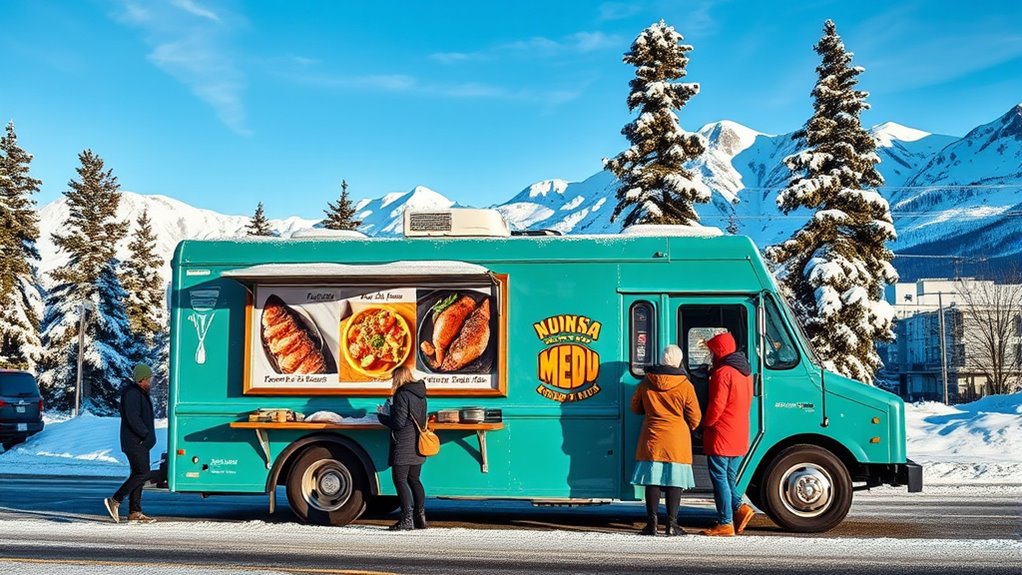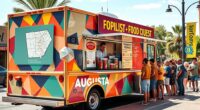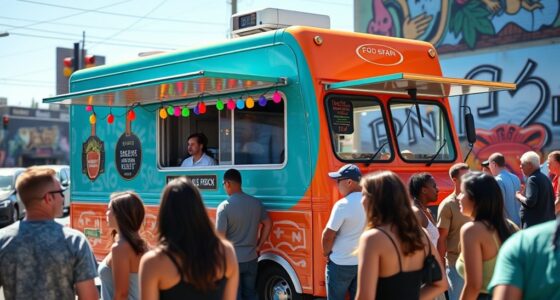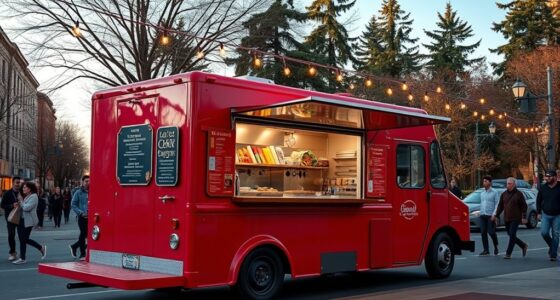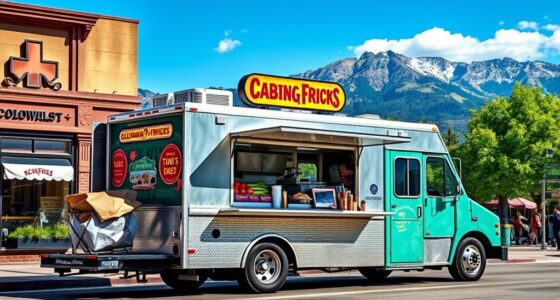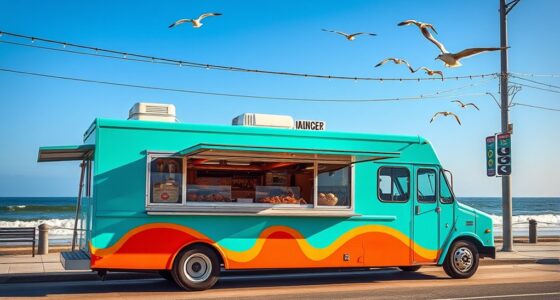To start a food truck in Anchorage, AK, you need to focus on creating a strong brand that highlights regional flavors and building customer loyalty through social media and local events. Make sure you understand local permits, health regulations, parking rules, and licensing processes. Plan your menu, pricing, and equipment carefully while exploring financing and shared kitchen options. For tips on growing your business and connecting with the community, keep exploring further steps.
Key Takeaways
- Obtain necessary permits and licenses from Anchorage and Alaska authorities, including health and parking permits.
- Develop a strong branding strategy and menu featuring local flavors like salmon and wild berries.
- Choose durable, space-efficient kitchen equipment tailored to your menu and climate considerations.
- Engage with the community through social media, local events, and partnerships to build loyal customers.
- Implement contactless payment systems and inventory tracking to streamline operations and improve customer experience.
Starting a Food Truck Business
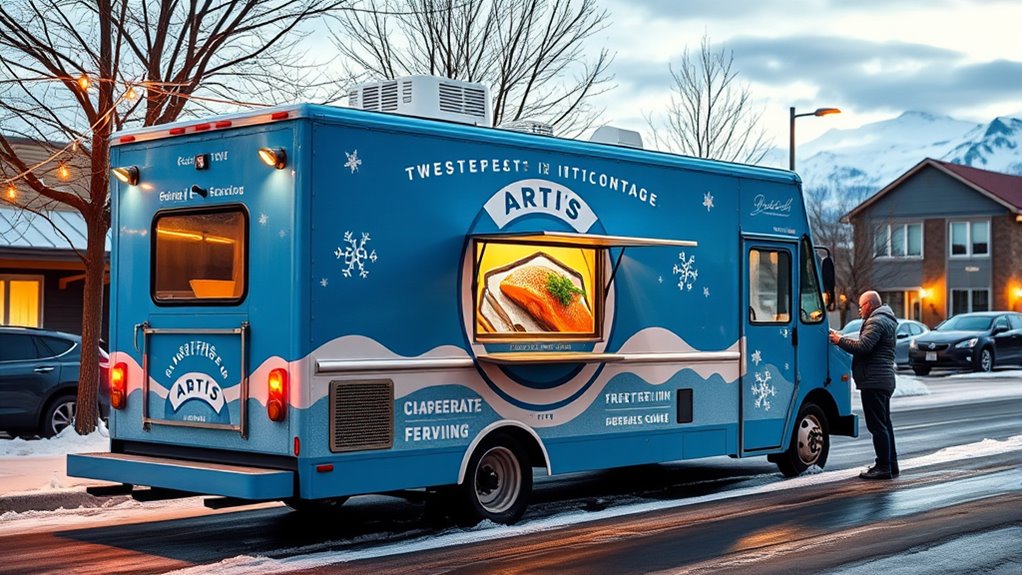
Starting a food truck business can be an exciting and profitable venture, especially in Anchorage where there’s a strong demand for diverse and convenient food options. To stand out, focus on effective food truck branding that reflects your unique style and menu. Strong branding helps attract customers and creates a memorable experience. Customer engagement is key; interact with your patrons through social media, respond to feedback, and participate in local events to build loyalty. Keep your branding consistent across your truck’s design, menu, and online presence. Additionally, understanding personality traits of both yourself and your team can enhance your customer interactions and team dynamics. By establishing a clear identity and actively engaging with your audience, you’ll increase visibility and draw repeat business. Remember, a well-branded food truck with excellent customer engagement sets the foundation for long-term success in Anchorage’s competitive food scene.
Understanding Local Requirements
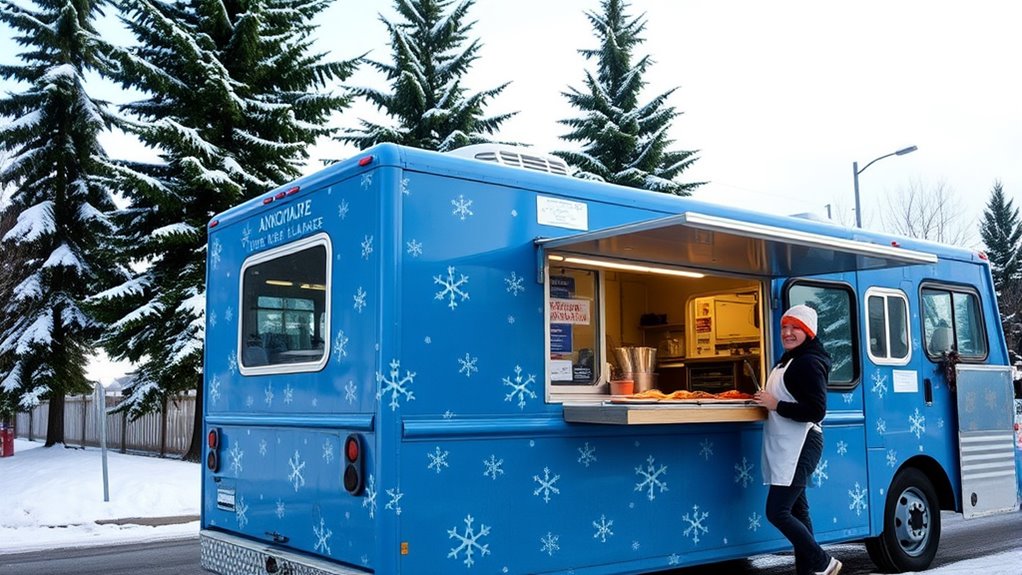
To start your food truck in Anchorage, you need to understand the local requirements, including the permit application process and food safety inspections. Make sure to check the specific designated street parking zones where you’re allowed to operate. Staying on top of these rules will help you avoid fines and get your business up and running smoothly. Embracing creative problem-solving can also help you navigate any unexpected challenges in setting up your food truck operation.
State and City Permit Application Process
Guiding the permit application process in Anchorage requires understanding both state and city requirements to guarantee your food truck operates legally. The permit process involves several application steps, each essential for compliance. First, you must submit applications to both the Alaska Department of Environmental Conservation and Anchorage’s city offices. These applications verify your adherence to health, safety, and zoning standards.
Be aware that:
- You’ll need to gather specific documents like proof of insurance and vehicle registration.
- There are fees associated with each permit, so budget accordingly.
- Permits must be renewed periodically, requiring ongoing compliance.
- Checking local regulations beforehand helps prevent delays or rejections.
Following these application steps ensures you meet all legal requirements and launch your food truck smoothly.
Food Safety Inspection Checklist
Understanding the local food safety inspection requirements is vital to guarantee your food truck complies with Anchorage’s health standards. The inspection checklist outlines specific standards for cleanliness, food storage, and equipment. You’ll need to verify that all surfaces are sanitized regularly and that proper temperature controls are maintained for perishable items. Make sure your food safety protocols include handwashing stations, pest control measures, and safe waste disposal. Anchorage’s health department may also require documentation of staff training on food safety practices. Conduct a thorough self-inspection before your official visit to identify and correct any issues. Following the inspection checklist carefully helps ensure a smooth process and demonstrates your commitment to food safety, protecting your customers and your business.
Designated Street Parking Zones
Before setting up your food truck in Anchorage, familiarizing yourself with the designated street parking zones is essential. Anchorage has specific parking regulations and street signage that determine where you can legally park. Ignoring these rules can result in fines or towing. Make sure to pay attention to posted signage indicating parking hours, restrictions, and zone designations.
- Always verify street signage before parking your truck
- Respect time limits and restricted hours
- Look for designated zones for commercial vehicles
- Obey parking regulations to avoid penalties
Understanding these details helps guarantee smooth operations and legal compliance. Anchorage’s parking rules are designed to manage street space effectively, so taking time to learn them benefits your business and prevents unnecessary issues.
Setting Up Your Base of Operations
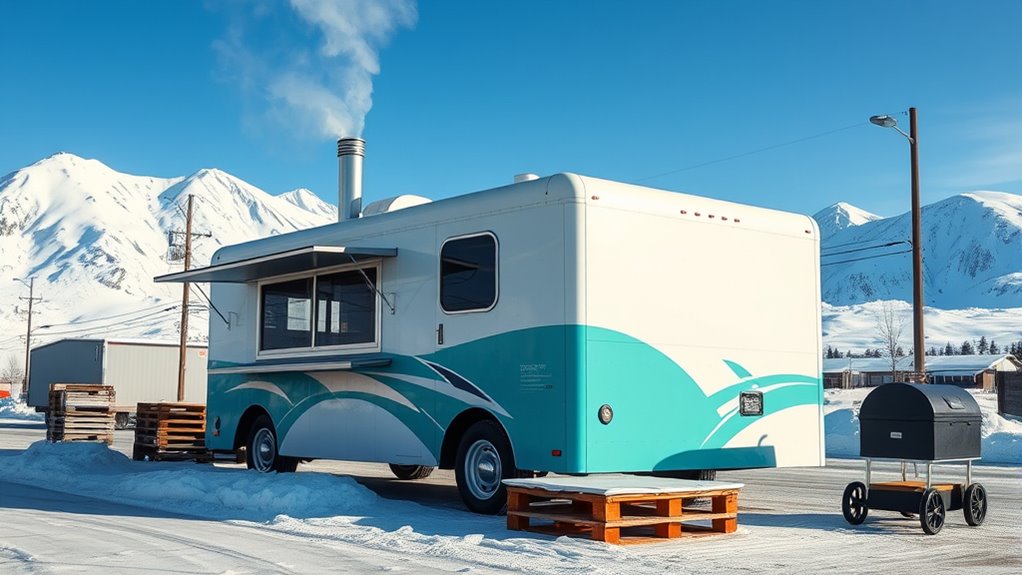
Choosing the right kitchen setup is essential for your food truck’s success. You can explore shared kitchen licensing options or invest in custom kitchen equipment tailored to your menu. Making these decisions early helps guarantee your operations run smoothly from the start. Additionally, understanding cookie consent requirements can help ensure compliance with privacy regulations and maintain customer trust.
Shared Kitchen Licensing Options
Setting up your food truck’s base of operations often involves exploring shared kitchen licensing options, which can save you time and money. Shared kitchens provide a commercial kitchen permit, allowing you to prepare food legally without building your own facility. These kitchens are ideal for startups or those testing new concepts. When choosing a shared kitchen, consider:
- Location and accessibility
- Hygiene and cleanliness standards
- Equipment availability
- Cost and rental terms
Utilizing shared kitchen licensing simplifies the process of obtaining commercial kitchen permits, making it easier to meet health department requirements. This setup helps you focus on menu development and marketing while ensuring compliance with local regulations. Shared kitchens can be a flexible, cost-effective way to establish your food truck’s operational base in Anchorage.
Custom Kitchen Equipment Selection
Selecting the right kitchen equipment is essential for running a successful food truck in Anchorage. With custom kitchen design, you can tailor your setup to match your menu and workflow, making your operations more efficient. Choose durable appliances that withstand the local climate and frequent travel. Prioritize equipment maintenance to keep everything running smoothly and minimize downtime. Regular upkeep guarantees your appliances stay in top shape, saving you money long-term. Think about compact, versatile pieces that maximize limited space while meeting health and safety standards. Invest in quality equipment that supports your menu and growth plans. A well-planned, customized kitchen setup will streamline your daily tasks and help you serve delicious food consistently to your customers.
Budgeting and Financing Your Food Truck
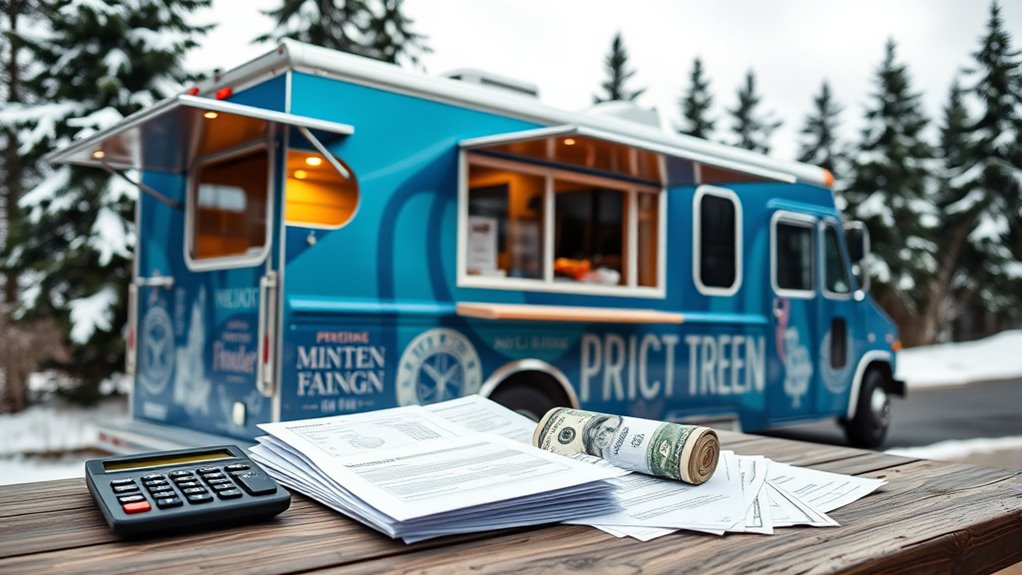
To get your food truck rolling, you need to plan your budget carefully, starting with the initial equipment costs. Explore local small business grants that can help offset expenses and consider different insurance options to protect your investment. By understanding these financial aspects, you’ll set a solid foundation for your food truck venture in Anchorage. Additionally, researching investment options like equipment financing or leasing can help manage upfront costs more effectively.
Initial Equipment Purchase Costs
Starting your food truck venture requires a clear understanding of initial equipment costs, which can vary widely based on your menu and truck size. Conducting a thorough cost analysis helps you identify essential equipment and avoid overspending. You may contemplate equipment leasing as a cost-saving option, allowing you to spread out payments instead of large upfront expenses. Keep in mind that high-quality appliances ensure better durability and food safety. Here’s what to consider:
- Commercial-grade kitchen appliances
- Food prep tools and utensils
- Refrigeration and storage units
- Point-of-sale systems
Local Small Business Grants
Securing local small business grants can provide a vital funding source to help cover your food truck’s startup costs, including equipment, permits, and initial inventory. These grants can also support your efforts in establishing strong food truck branding, which is essential for attracting customers. With the right funding, you can invest in professional branding materials and effective social media marketing campaigns to build visibility in Anchorage. Many local programs aim to nurture small businesses, so research options tailored to food entrepreneurs. Applying for grants requires clear business plans and demonstrating community impact, but the effort can considerably reduce your financial burden. By leveraging these grants, you’ll be better positioned to launch a successful food truck that stands out through strategic branding and active social media presence.
Business Insurance Policy Options
Choosing the right business insurance policy is essential for budgeting and financing your food truck, as it protects your investment and helps manage potential risks. Your policy coverage should be tailored to your specific needs, including liability, property, and equipment coverage. Carefully compare options to find a plan that offers extensive protection without overspending. Remember, a well-chosen business insurance policy can prevent unexpected costs from derailing your startup. When evaluating coverage, consider:
- Adequate liability protection for customer and vehicle incidents
- Coverage for equipment and inventory losses
- Business interruption protection
- Customizable policy options for flexibility
Investing in the right business insurance ensures your food truck remains financially secure, giving you peace of mind to focus on growth and success.
Designing Your Menu and Pricing Strategy
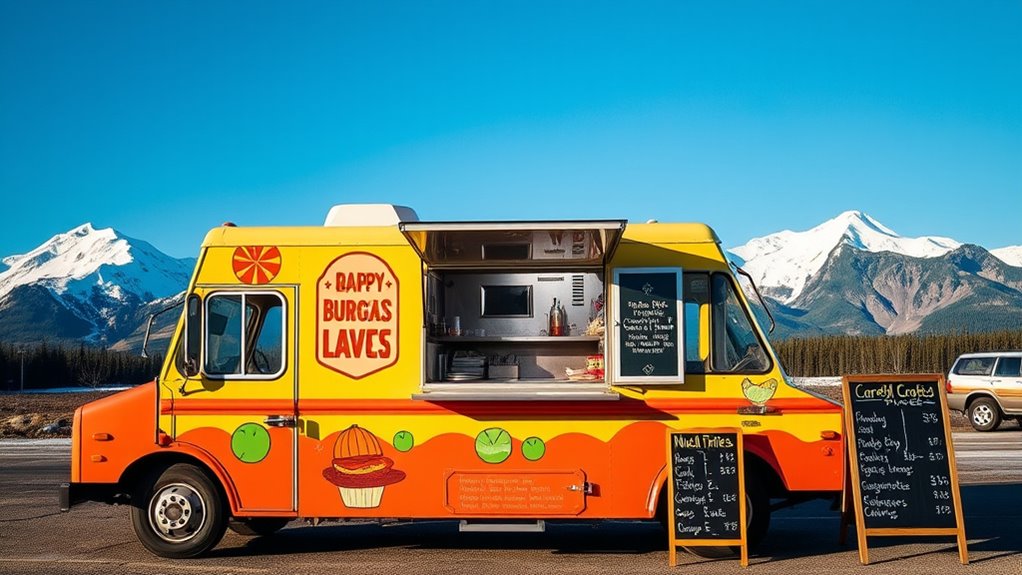
When designing your menu, focus on incorporating seasonal ingredients and local flavors to attract customers and stand out in Anchorage. Keep your offerings cost-effective by engineering your menu to balance popular items with manageable ingredient costs. This approach helps you set competitive prices while maintaining quality and profitability. Additionally, understanding ingredient shelf life can help you manage freshness and reduce waste, ensuring your ingredients stay fresh and safe for your recipes.
Seasonal Ingredients and Local Flavors
In Anchorage, AK, leveraging seasonal ingredients and local flavors can set your food truck apart and attract loyal customers. Incorporating fresh, locally sourced seasonal ingredients keeps your menu dynamic and authentic. Highlight regional flavors like wild berries, salmon, or reindeer to resonate with the community. To make the most of these ingredients, consider:
- Using seasonal ingredients to create limited-time specials
- Showcasing local flavors prominently on your menu
- Building relationships with local farmers and fishermen
- Offering tasting flights to introduce customers to regional tastes
Cost-Effective Menu Engineering
Leveraging seasonal ingredients and local flavors offers a great way to attract customers, but it’s equally important to design a menu that balances quality with profitability. Effective ingredient sourcing helps keep costs low while maintaining freshness, so focus on local suppliers and bulk purchasing. When planning your menu, prioritize dishes that can be easily customized to suit different tastes, allowing you to adjust portion sizes and ingredients based on availability and popularity. This menu customization not only reduces waste but also maximizes profit margins. Price your items strategically by considering ingredient costs and customer willingness to pay. By streamlining your offerings and sourcing wisely, you create a cost-effective menu that appeals to customers and sustains your food truck business in Anchorage.
Technology and Operations
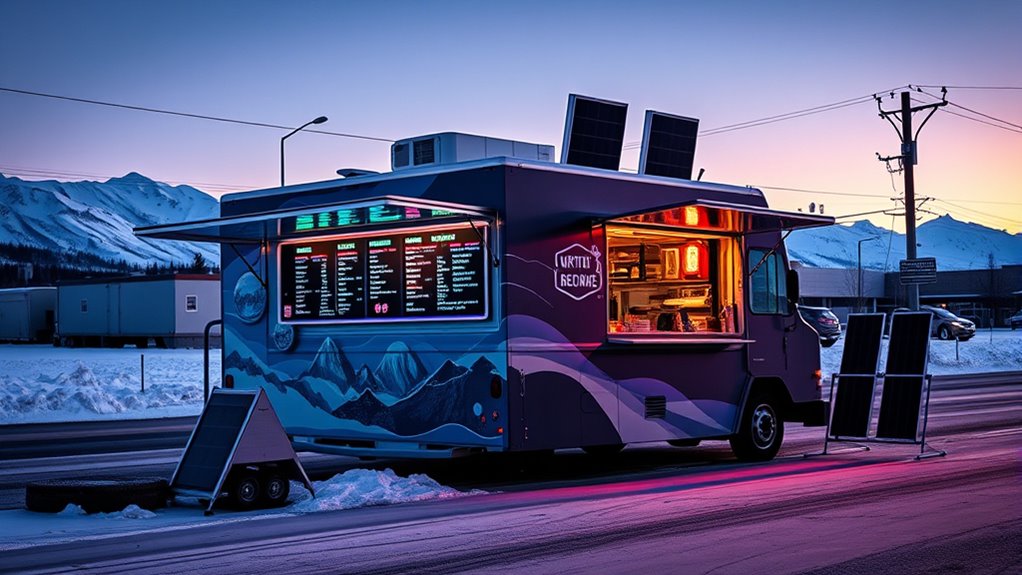
Implementing contactless payment options can speed up transactions and improve customer safety. Using a mobile POS system helps you manage sales and inventory efficiently on the go. With stock tracking tools, you’ll stay ahead of supply needs and reduce waste, keeping your operation smooth.
Contactless Payment Options Available
Adopting contactless payment options can streamline your food truck’s operations and enhance customer convenience. Offering contactless payment methods helps speed up transactions and reduces cash handling risks. Customers appreciate the ease of cashless transactions, especially during busy hours. You can accept payments via NFC-enabled cards, mobile wallets, and apps, making the process quick and safe. This technology also minimizes errors and provides instant receipts. To maximize benefits, consider these options:
- NFC-enabled card readers
- Mobile payment apps (Apple Pay, Google Pay)
- QR code scanning
- Contactless POS terminals
Mobile POS and Stock Tracking
Have you considered how mobile POS systems and stock tracking can boost your food truck’s efficiency? A mobile POS allows you to process orders quickly, reducing wait times and improving customer satisfaction. It also simplifies payment methods, including contactless options. With integrated stock tracking, you’ll stay on top of inventory levels in real-time, preventing shortages and overstocking. This combination streamlines your operations, saves time, and reduces errors. You can easily monitor sales trends, identify popular menu items, and adjust purchasing accordingly. Plus, mobile POS systems often sync with your stock tracking tools, giving you instant insights into your inventory status. Overall, adopting these technologies keeps your food truck running smoothly, helping you serve more customers and maximize profits.
Marketing and Growing Your Presence

You can boost your visibility by participating in popular local events and venues where your target customers gather. Encouraging satisfied customers to leave reviews helps build your reputation and attract new patrons. Partnering with other local businesses creates opportunities for cross-promotion and expanding your reach in Anchorage.
Popular Local Event Venues
Local event venues in Anchorage offer prime opportunities to showcase your food truck and attract new customers. These venues draw diverse crowds, making them ideal for boosting your visibility. To stand out, focus on eye-catching food truck decoration that reflects your brand and draws attention. You can also leverage social media marketing before and after events to maximize exposure. Consider participating in festivals, farmers markets, and community fairs for consistent traffic. Building relationships with organizers can help you secure prime spots and repeat appearances. Remember, a well-decorated truck combined with active social media promotion can turn event visits into loyal customers. Make each appearance count by engaging attendees and encouraging them to share their experiences online. This approach effectively grows your presence in Anchorage’s vibrant food scene.
Customer Reviews and Local Partnerships
Wondering how to build a loyal customer base and boost your food truck’s reputation in Anchorage? Focusing on customer reviews and local partnerships is key. Encourage honest customer feedback to improve your offerings and demonstrate your commitment to quality. Building partnership collaborations with local businesses, events, and suppliers can expand your reach and increase visibility. These collaborations create a network that supports your growth and reinforces trust in your brand. Consider the following:
| Customer Feedback | Partnership Collaborations |
|---|---|
| Shows what customers want | Expands your local presence |
| Boosts your reputation | Builds community trust |
| Helps improve menu | Increases event opportunities |
| Encourages repeat business | Creates cross-promotional opportunities |
| Provides valuable insights | Strengthens community ties |
Local Networking Opportunities Boost Success
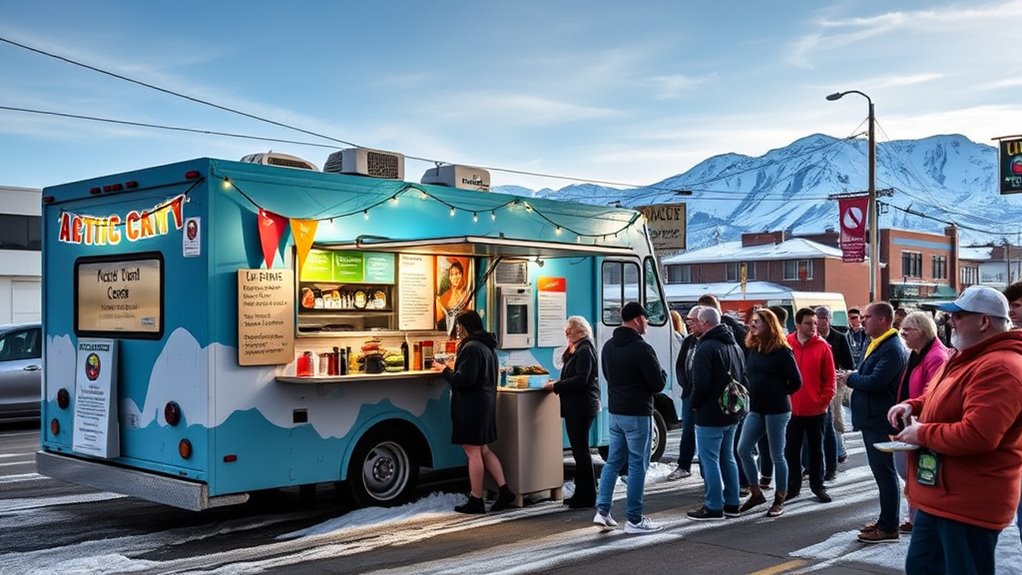
Building relationships through local networking opportunities can considerably boost your food truck’s success in Anchorage. Participating in local food festivals and community events helps you connect directly with potential customers and other vendors. These opportunities foster trust, increase visibility, and create loyal patrons who appreciate your involvement in community engagement.
Consider these strategies:
- Attend local food festivals to showcase your menu
- Join community groups or business associations
- Collaborate with other food vendors for cross-promotion
- Engage with local media and social media communities
Frequently Asked Questions
What Permits Are Required Specifically for Food Trucks in Anchorage?
You need to obtain food truck permits and Anchorage licensing before hitting the streets. Start by applying for a mobile food vendor permit through the Anchorage Health Department, which guarantees your truck meets health standards. You’ll also need a business license from Anchorage’s municipality. Make sure to check local zoning laws and get any necessary parking permits. Staying compliant with all food truck permits and Anchorage licensing keeps you legally operating and ready to serve customers.
How Do Weather Conditions Affect Food Truck Operations in Anchorage?
Weather in Anchorage can be a double-edged sword, like a storm shaping a river’s course. Cold temperatures and snow may slow your food truck’s movement, forcing you to adapt with indoor dining options or proper food preservation methods. Rain and wind can challenge setup, so plan for shelter and flexible schedules. Staying prepared helps you keep serving hot meals and maintaining quality, no matter what the weather throws your way.
Are There Seasonal Restrictions for Operating Food Trucks in Anchorage?
Yes, you’ll face seasonal restrictions for operating your food truck in Anchorage. During winter, you need to obtain seasonal licensing and plan for winter storage solutions since cold weather can limit outdoor operations. Keep in mind that regulations may vary, so check with local authorities to verify you meet all seasonal requirements. Proper planning for off-season storage and licensing helps you stay compliant and ready to serve when the weather warms up.
What Local Events Offer the Best Opportunities for Food Truck Presence?
You should focus on local events like food festivals and farmers markets, which offer prime opportunities for your food truck. Partnering with food festivals can boost your visibility and attract larger crowds, while farmers markets provide consistent, community-focused sales. By engaging with these events, you can build a loyal customer base, increase sales, and establish your presence in Anchorage’s vibrant food scene.
How Do I Find Reliable Food Truck Equipment Suppliers in Anchorage?
Did you know that over 60% of successful food truck owners credit reliable vendor relationships for their smooth operations? To find dependable equipment suppliers in Anchorage, start by researching local vendors online and reading reviews. Visit their showrooms, ask about warranties, and inquire about equipment maintenance services. Building strong relationships guarantees you get quality gear and ongoing support, which is essential for keeping your food truck running efficiently.
Conclusion
Starting a food truck in Anchorage isn’t just a small step—it’s your launch into the culinary universe! With the right planning, you’ll be serving up mouthwatering dishes faster than a snowstorm hits. Embrace local networking and innovative marketing, and you’ll turn your food truck into an unstoppable, city-wide sensation. Get ready to conquer Anchorage’s streets with flavors so bold, they’ll make even the coldest days feel like a summer feast!
